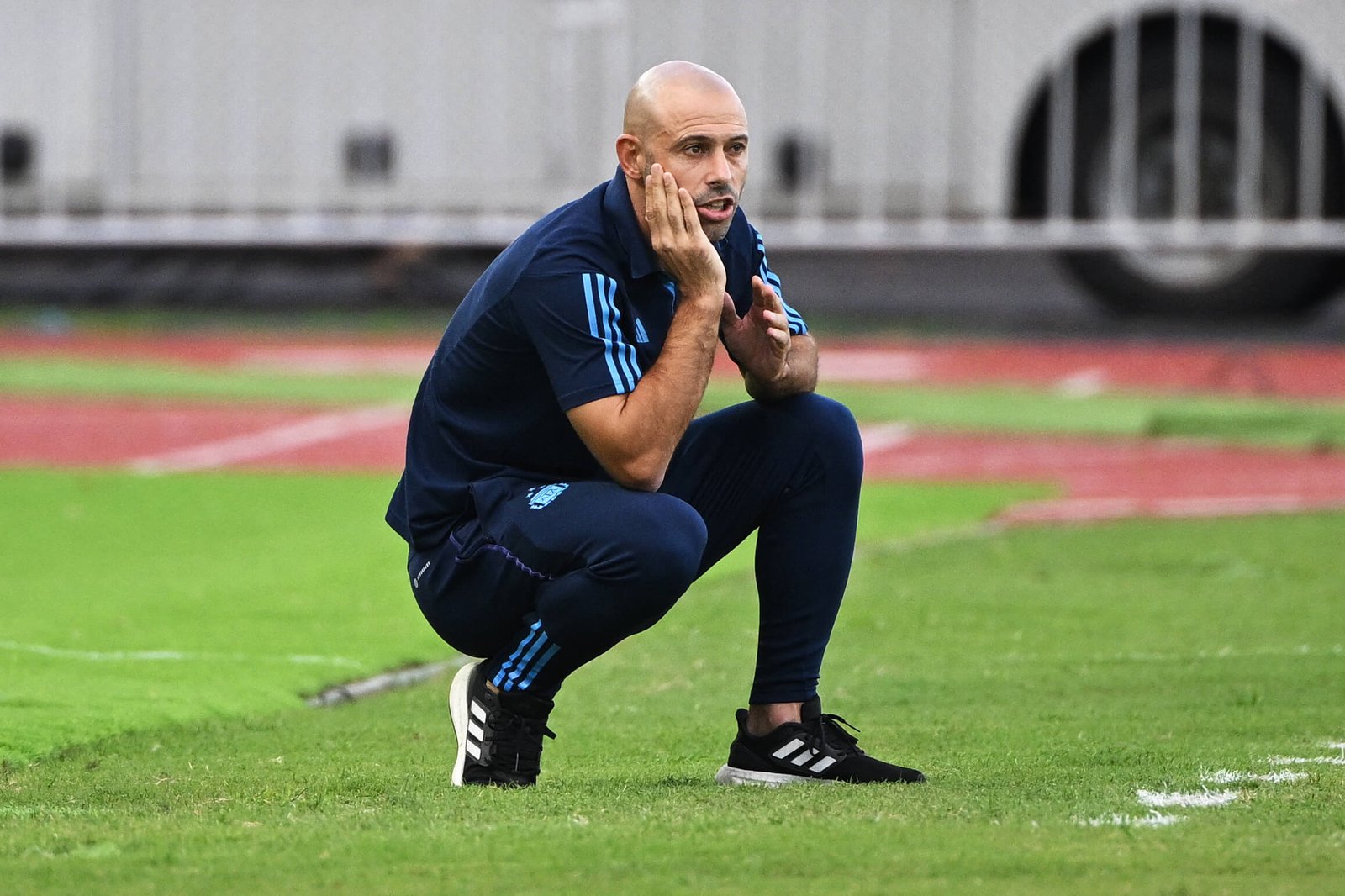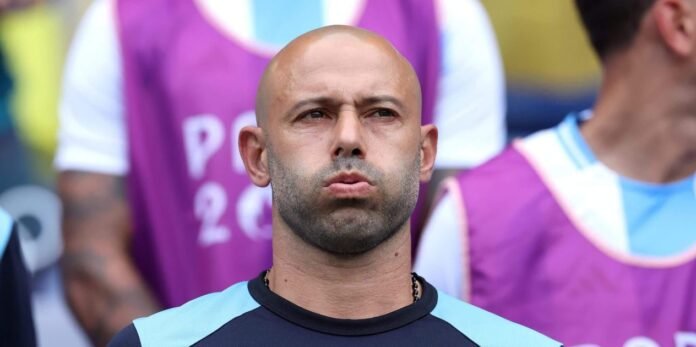Six years after Argentina’s debacle at the World Cup in Russia, Lionel Messi and Javier Mascherano will reunite in Miami. At that tournament, Argentina were largely hapless before being eliminated by eventual champions France in the round of 16. Messi scored one goal in their four matches.
Messi was the soft-spoken captain of that side but Mascherano, nicknamed El Jefecito (The Little Boss), was their emotional leader. The former Barcelona and Argentina teammates will now function in a completely different dynamic: player and coach.
Mascherano, 40, was announced as Inter Miami’s new head coach on Tuesday. He succeeds his compatriot Gerardo ‘Tata’ Martino, who led Miami from being bottom-dwellers in 2023 to a historic season that included winning the Supporters’ Shield, awarded to the team with the league’s best regular-season record.
His appointment is the least surprising news of the day for many reasons.
Messi and Mascherano won 19 trophies together at Spanish side Barcelona across seven and a half seasons. And over 13 years together with Argentina, they suffered excruciatingly painful losses in quick succession. Argentina lost the 2014 World Cup final, followed by consecutive runner-up finishes at Copa America in the following two years. Ever since, Mascherano has remained part of Messi’s intimate circle of trust.
Without mentioning Mascherano by name, Miami’s co-owner Jorge Mas admitted on Friday that he sought Messi’s input regarding the hire. “I want Leo to feel comfortable with the new coach coming in,” Mas said. Mascherano was a midfield enforcer for Barcelona, playing alongside Messi’s now Miami teammates Sergio Busquets, Jordi Alba and Luis Suarez.
Mascherano, left, and Messi at the 2018 World Cup (Roman Kruchinin/AFP via Getty Images)
Who can blame Mas? Messi has been invested in the Miami project since coming to MLS in the summer of 2023. The demands aren’t nearly as pressure-filled as his 17 years in Barcelona’s first team. Still, the Argentina captain and 2024 MLS MVP frontrunner has looked similarly driven as a late-career signing in the North American league. Mas can’t afford to lose Messi now.
If Mas wants Messi to play through the 2026 MLS season, when Miami are expected to open their new downtown stadium, it’s best to keep him happy. Messi’s influence at the club continues to grow and he’ll now play under a manager whose hire he appears to have approved.
Nevertheless, the Mascherano appointment may not be the best fit for Messi.
He has seemingly vouched for a former teammate who has never coached at first-team level. By doing so, Messi has made himself accountable for Miami’s successes (or failures) beyond his individual performances. Mas and the rest of Miami’s key decision-makers have also gambled. If Mascherano isn’t an immediate success, questions will be raised about choosing to replace the hugely experienced Martino with someone whose coaching career has only just begun.
Will Miami’s players in 2025 follow Messi’s lead or will they align themselves with Mascherano’s unproven footballing philosophy? Ideally, the answer will be both.
There’s a proof of concept — Argentina became Copa America (2021) and World Cup (2022) champions by embracing Messi’s dominant personality on the pitch and connecting tactically with Lionel Scaloni, the side’s inexperienced manager.
Speaking to Miami’s in-house media team, Mas said: “This job requires somebody with the experience to maximize our unique collection of talent — from our global superstars to our burgeoning homegrown players and our young international prospects, and everything in between.”
An uninformed opinion about MLS would deduce that Mascherano will be fine. It’s American soccer, after all. How hard could it be?
But the reality is MLS is notoriously unkind to foreign managers. There’s a cultural learning curve international players and coaches alike must overcome. That includes understanding the league’s overall skill level, the gruelling cross-country and international travel its teams endure, the financial restrictions that govern squad-building and an academy system with little history, among other challenges.

Mascherano has coached Argentina’s under-20 and under-23 teams (Federico Parra/AFP via Getty Images)
Mascherano will have to learn on the job at one of the most visible clubs in the league.
His record as the manager of Argentina’s highly touted under-20 and under-23 sides was notably underwhelming: early last year, he tried to quit after Argentina were eliminated at the group stage of the South American Under-20 Championship, which also meant they did not qualify for the age group’s World Cup a few months later. A self-professed admirer of Pep Guardiola’s positional play but with a preference for Luis Enrique’s tactics, Mascherano looked like he was in over his head.
World governing body FIFA later moved that Under-20 World Cup to Argentina after Indonesia was stripped of hosting duties, allowing his team a backdoor route into the finals, but Nigeria knocked them out at the last-16 stage.
A year on, at the Olympics in France, Argentina’s under-23s were augmented by four players who helped the senior side win the 2022 World Cup. Julian Alvarez, Nicolas Otamendi, Thiago Almada and backup goalkeeper Geronimo Rulli headlined a talented squad with gold-medal aspirations.
Mascherano’s command of the group as the figurehead wasn’t an issue. His sparkling playing career in Europe and reputation in Argentina as a national-team legend mattered. Argentina were a hard-working team, but far from well-oiled. Disorganized tactics overshadowed the brief spells of dominant play in possession. Argentina lost to a less-talented France in the quarterfinals.
With Miami, Mascherano will have more time to work on the small details that mold squads, but he won’t be coaching a team of Europe-based 20-year-olds.
Miami have a capable core of young players but are still limited from a depth perspective. There will be squad turnover and new additions, but Mascherano will likely face the same challenge that limited Martino’s teams. Putting Miami to one side, Martino’s most successful teams (Newell’s Old Boys, Libertad, Cerro Porteño and Atlanta United) were high-paced, high-pressing teams. They were also all championship-winning sides.
Martino had goals and creativity from Messi and Suarez. He had high-end tactical awareness but limited versatility from Busquets. Alba was excellent all season, but at 35, expending energy on the left flank was always calculated. For as long as the big four play for Miami, the head coach will be forced to tailor his tactics to their strengths and limitations. Last week, Mas set clear expectations for how Miami should play.
“It’s going to take a manager to play the style of football that Inter Miami wants to play, and we’re going to play an attacking style,” Mas said. “That’s what our teams are going to do, pressure other teams. We’re going to score goals. We’re going to push. This is a team that’s not going to sit back and wait for pressure, and play for 0-0 or 1-0 results with the talent we have.
“There’s pressure here to win and that pressure is going to continue. We expect that of ourselves as we’re going to expect that from our coaches and all of our players.”

Messi helped Miami win the MLS Supporters’ Shield last month (Carmen Mandato/Getty Images)
Of course, this could also go spectacularly well for Messi.
He has nearly two full seasons of MLS play under his belt. He understands the physical rigors and talent gap between U.S. and European football. His teammates have become more confident and more accustomed to his movement, or lack thereof. Messi has the MLS experience Mascherano doesn’t possess, something that his new coach will most certainly lean on.
Additionally, Miami as a collective understand what it takes to compete in MLS, even while overcoming a rash of injuries over a season. Messi and his teammates have won the club’s first trophies and have also tasted a stinging exit from this postseason.
In 2018, the Argentine press blamed much of the national team’s tumultuous World Cup elimination on a divided dressing room and a lack of respect for the head coach at the time, Jorge Sampaoli. Mascherano and Messi, along with a select group of players, were dubbed Messi’s “Club de Amigos” (The Friends Club), a hierarchical dynamic that hurt the side. Messi, it can be argued, didn’t truly flourish as the captain until Mascherano’s retirement later that year.
They will have to coexist again beginning in 2025 and surpass the many milestones that Miami enjoyed this past year. Mascherano told Spain’s Futbol Movistar Plus+ in 2022 that Guardiola is the most influential coach in the game for the impact the Spaniard had at Barcelona. But Masherano’s admiration for Luis Enrique, who coached him for three seasons at that club, is a sharp reminder of the challenge he’ll face in the States.
“Luis Enrique took (the Barcelona) idea one step further,” Mascherano said.
Now El Jefecito will have to do the same in Miami.
(Top photo: Claudio Villa/Getty Images)
Read the full article here


